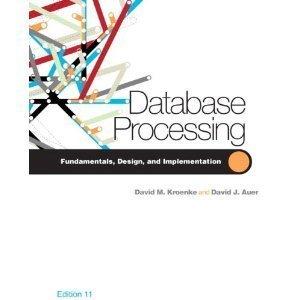Question
Modify thecodefrom cluster.py on eClass to implement bisecting k-means , which is an extension of the basic k-means algorithm. Start with one cluster containing all
Modify thecodefrom cluster.py on eClass to implement bisecting k-means, which is an extension of the basic k-means algorithm. Start with one cluster containing all data points, and then repeatedly split the largest cluster into two (k-means with k = 2) until you have the desired number of clusters. Use the program visual.py to see the results
import math import random
def euclidD(point1, point2): sum = 0 for index in range(len(point1)): diff = (point1[index]-point2[index]) ** 2 sum = sum + diff return math.sqrt(sum)
def manhattanD(point1, point2): sum = 0 for i in range(len(point1)): diff = abs(point1[i]-point2[i]) sum = sum + diff return sum
def createCentroids(k, datadict): centroids=[] centroidCount = 0 centroidKeys = [] random.seed(68)
keys = list(datadict.keys())
while centroidCount < k: rkey = random.randint(0,len(datadict)) if rkey not in centroidKeys: centroids.append(datadict[keys[rkey]]) centroidKeys.append(rkey) centroidCount = centroidCount + 1 return centroids
def showCentroids(centroids): print("CENTROIDS", end = " ") for cent in centroids: #print("%4.1f" % (cent[0]), end = " ") print(cent, end = " ") print()
def showClusters(clusters, datadict): for c in clusters: print ("CLUSTER", end = " ") for key in c: print(datadict[key], end=" ") print()
def assignPointsToClusters(centroids,datadict): clusters = [] k = len(centroids) for i in range(k): clusters.append([]) for akey in datadict: distances = [] for clusterIndex in range(k): dist = euclidD(datadict[akey],centroids[clusterIndex]) distances.append(dist)
mindist = min(distances) index = distances.index(mindist) clusters[index].append(akey) return clusters
def updateCentroids(clusters, centroids,datadict): dimensions = len(datadict[list(datadict.keys())[0]]) k = len(centroids) for clusterIndex in range(k): sums = [0]*dimensions for akey in clusters[clusterIndex]: datapoints = datadict[akey] for ind in range(len(datapoints)): sums[ind] = sums[ind] + datapoints[ind] for ind in range(len(sums)): clusterLen = len(clusters[clusterIndex]) if clusterLen != 0: sums[ind] = sums[ind]/clusterLen centroids[clusterIndex] = sums return centroids
def createClusters(centroids, datadict, repeats): k = len(centroids) doAgain = True apass = 0 while doAgain and apass < repeats: clusters = [] prevClusters = clusters
clusters = assignPointsToClusters(centroids,datadict)
if clusters == prevClusters: doAgain = False
centroids = updateCentroids(clusters, centroids, datadict) apass = apass + 1
return clusters
def readFile(filename): datafile = open(filename, "r") datadict = {}
key = 0 for aline in datafile: key = key + 1 items = aline.split() datadict[key] = [int(k) for k in items] return datadict
def main(): datadict = readFile("scores.txt") numClusters = 5 # number of clusters dataCentroids = createCentroids(numClusters, datadict) maxPass = 10 dataClusters = createClusters(dataCentroids, datadict, maxPass)
if __name__ == "__main__": main()
Step by Step Solution
There are 3 Steps involved in it
Step: 1

Get Instant Access to Expert-Tailored Solutions
See step-by-step solutions with expert insights and AI powered tools for academic success
Step: 2

Step: 3

Ace Your Homework with AI
Get the answers you need in no time with our AI-driven, step-by-step assistance
Get Started


